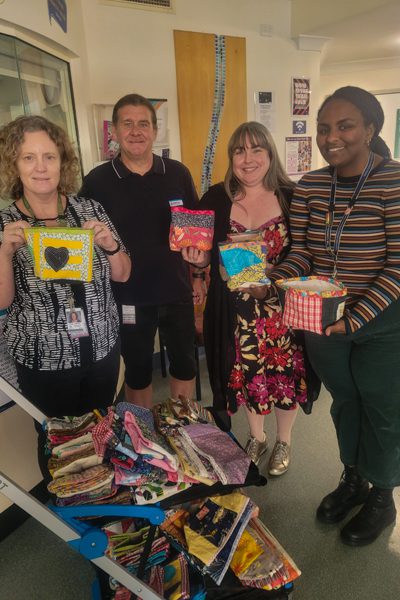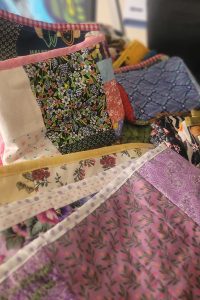
(Left to Right) Tricia (Senior Carer Peer Coordinator), Darren (Peer Support Worker), Maree (The Common Good) and Elsie (The Common Good).
Belonging baskets handcrafted with care for hospital patients
A community group from Tweed Heads has crafted 56 patchwork ‘belonging baskets’ for patients in The Prince Charles Hospital’s mental health units.
Senior Carer Peer Coordinator Tricia Carter explains how this seemingly small gesture makes such a difference to patients.
“Often when these patients arrive at the hospital they have limited belongings with them. The beautiful belonging baskets provide patients with something to brighten their room and to take home with them when they are discharged,” said Tricia.
“Receiving something handcrafted from a person you don’t know is especially significant – it reinforces to patients that people care about them
“We can’t thank the group enough for their thoughtful gesture.”
Karen Lockhart from the Fabric Floozie Patchwork and Needlework Group, part of the Coolangatta Seniors, was delighted to be part of the initiative.
“We chose bright fabric colours for the baskets so they would stand out and bring a bit of cheer to the patient’s rooms,” said Karen.
“It was very rewarding for our group to make the baskets and to know they were going to patients in the hospital’s mental health units. We wanted the patients to know someone was thinking of them and wanted to contribute, even in a small way, to their recovery.”

Colourful handcrafted ‘belonging baskets’.
Chloe Nguyen, General Manager Communications, Marketing and Engagement at The Common Good, an initiative of The Prince Charles Hospital Foundation, who co-ordinated the basket donation, explains how this is just one way the charity supports the The Prince Charles Hospital’s mental health units.
“The Common Good is committed to improving patient outcomes through funding cutting-edge equipment and vital medical research. However, support is sometimes more immediate and practical,” said Chloe.
“For patients in mental health units, we fund therapy dog visits and conduct annual toiletry drives. In this case, we connected incredible community groups like the Fabric Floozie Patchwork and Needlework Group with meaningful ways to make an impact for patients in need.”
